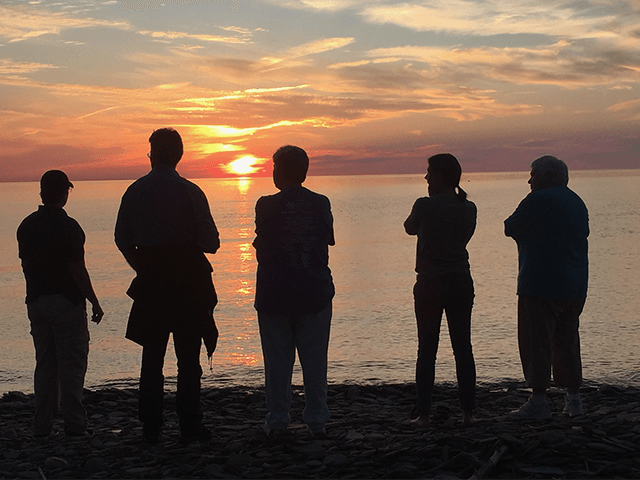
Toxic, toxicity, groans, and suffering. These are unusual words to begin a consideration of Goal 6, Ecological Spirituality. Perhaps they are the most appropriate words as we reflect on this goal in the midst of our present reality.
Our reality: We read about and experience distorted, even false statements and activities made and presented as true. Fear, mistrust, hatred is felt everywhere.
Judges are threatened. Government workers are intimidated. Libraries and staffs are targeted.
Weather patterns have been disrupted. Droughts, excessive rains and flooding, tornadoes and hurricanes, and pollution are destroying lives and livelihoods. And so much more....
What does all this have to do with Ecological Spirituality?
First, this goal call us to remember the connections.
“Ecological Spirituality springs from a profound ecological conversion and helps us to ‘discover God in all things’, both in the beauty of creation and in the sighs of the sick and the groans of the afflicted, aware that the life of the spirit is not dissociated from worldly realities.” —Laudato Si’ Platform Committee
We read in Laudato Si #139: When we speak of the “environment”, what we really mean is a relationship existing between nature and the society which lives in it….We are part of nature, included in it and thus in constant interaction with it….It is essential to seek comprehensive solutions which consider the interactions within natural systems themselves and with social systems. We are faced not with two separate crises, one environmental and the other social, but rather with one complex crisis which is both social and environmental. Strategies for a solution demand an integrated approach…..
This goal also invites us to explore what is offered in our spiritual tradition. We discover an invitation to:
- Remain
- Suffer
- Lament
This may not be an aspect of spirituality we are drawn to but it may be what is most needed today.
“Toxic” and “toxicity” are words being used to describe our times. Mary Beth Ingham, CSJ, has spoken of our hatred – our violence – in how we think about each other. How we talk to each other. She said we are surrounded by toxic spiritual energy. We are poisoning the spiritual shell that protects our earth.
Pope Francis writes: A sense of deep communion with the rest of nature cannot be real if our hearts lack tenderness, compassion and concern for our fellow human beings…. Everything is connected. Concern for the environment thus needs to be joined to a sincere love for our fellow human beings and an unwavering commitment to resolving the problems of society. — Laudato Si #91
In Laudato Si #89 he wrote, “God has joined us so closely to the world around us that we can feel the desertification of the soil almost as a physical ailment, and the extinction of a species as a painful disfigurement”.
So what is Ecological Spirituality inviting us to?
Remain: Stay and acknowledge the toxicity of our day – with the hatred and violence that surround us. Listen for the falsehood and the distortion we hear every day. Notice the affect it is having on us. Be aware of how we hold fast to our own ideas and ways as we diminish and even demonize others who disagree. Our spiritual tradition calls us to stay in the present – be attentive, pay attention, be aware, see, and listen. We are to remain in this moment.
We are reminded that, "Our goal is….to become painfully aware, to dare to turn what is happening to the world into our own personal suffering and thus to discover what each of us can do about it." Laudato Si #19
Suffer: Suffering has always been a part of reality. What do we do with it? Will it be a source of our transformation? How can it make us more sensitive to the suffering of others, connecting us to the woundedness and suffering of all creation?
Lament: To express sorrow, pain, and even confusion has always been part of our spirituality. Scripture holds powerful examples of lament. Catholic Christians through the ages have ritually processed such experiences. Lament might be the most appropriate way to clearly state our confusion and concern about our reality today. No explanations, justifications, or remedies – just simple, clear expressions of regret and loss. Passionate expressions of grief, perhaps presented ritually within a community of others.
We have looked at only one small piece of what Ecological Spirituality offers. Additional dimensions will be explored in the months to come. There is so much more to consider.
Suggested actions:
- Identify two ways you add to our toxic environment. Spend some time reflecting on why and when this happens.
- Consider: What do you lament these days? How could you give expression to that?
